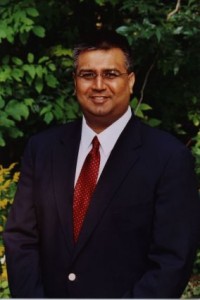Muzzammil Hassan, a graduate of the William E. Simon Graduate School of Business Administration and CEO of Bridges TV, the first American Muslim television network broadcast in English, was convicted of beheading his wife of eight years, on Monday, Feb. 7.
Hassan, a Buffalo, New York resident, acted as his own attorney in the trial, in which he claimed to be a battered spouse acting in self-defense. He was convicted on second-degree murder charges after the jury deliberated for only 50 minutes.
Hassan, 46, a Pakistani immigrant, graduated magna cum laude with an MBA from the Simon School in 1996. He later moved to Buffalo, where he enjoyed a successful career as a bank vice-president. In 2004, he started Bridges TV with his wife, fellow Pakistani Aasiya Zubair Hassan, after she prompted him to develop media that would counter post-9/11 stereotypes of Muslims. “I realized that the only way to undo misconceptions was to create our own media forum, from which our stories and culture would be shared with the world,” Hassan said in a 2003 interview with Al Jazeera English news network. “Bridges TV gives American Muslims a voice and will depict them in everyday, real life situations.”
The network, which is broadcast through the United States and Canada, features news programs, talk shows, sitcoms and films centered on Muslim life in America. The couple had two children together, in addition to Hassan’s two teenaged children from a previous marriage. Ms. Hassan had confided in friends that her husband was abusive, and the couple had a history of police responding to domestic dispute calls at their home in Orchard Park, a well-to-do Buffalo suburb. In an interview with the Huffington Post, Nancy Sanders, the one-time news director of Bridges TV, said she thought the murder was “domestic abuse that got out of control.
On Feb. 12, 2009, six days after his wife filed for a divorce and obtained an order of protection, Hassan repeatedly stabbed her in an unlit hallway of Bridges TV’s Buffalo studio, ultimately using two hunting knives to behead her. He surrendered to police about an hour after the murder. He claimed to have attacked his wife because he believed she had pulled a knife, which she had threatened him with earlier in the day, out of her coat pocket.
Shortly after Hassan’s arrest, Bridges TV’s website posted a message saying the station was “deeply shocked and saddened by the murder of Aasiya Hassan and subsequent arrest of Muzzammil Hassan. Our deepest condolences and prayers go out to the families of the victim.”
More than 200 people gathered at the Muslim Community Center in Amherst, N.Y. for Ms. Hassan’s funeral. Muslim leaders were outraged by suggestions in the media that the murder was an “honor killing” connected to Hassan’s religious beliefs. Dr. Sawsan Tabbaa, a Muslim community leader who teaches at SUNY Buffalo, told The New York Times, “This is not an honor killing” and “[it] has nothing to do with his faith.”
According to an article in The Buffalo News, Hassan said during his cross-examination that he “kind of blacked out” while murdering his wife, claiming that, “The whole thing happened so fast I don’t remember any of it.” The article also states that, during the trial, Hassan explained that he removed his blood-stained shirt after the murder “because I was hot.” Two of Hassan’s children testified against him in the trial, confirming that their father had a history of violent outbursts.
Bridges TV halted its news services for three months after the murder, but has since resumed providing its full programming to approximately four million homes. Hassan will be sentenced on March 9 and could get 25 years to life, the maximum sentence for second-degree murder.
Silverstein is a member of
the class of 2013.


